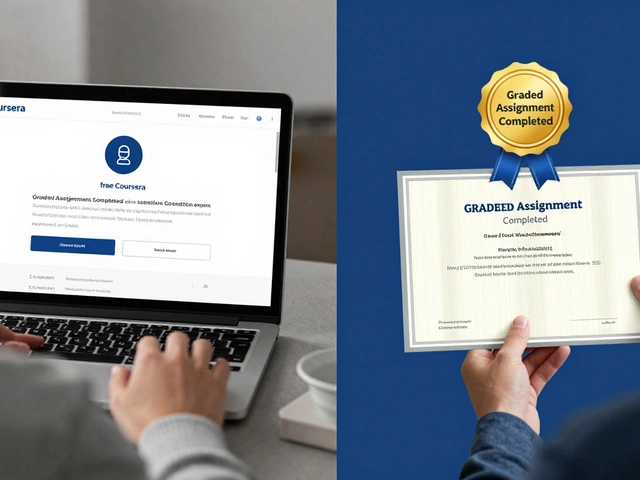Ever chatted with someone and thought, "Wow, I wish I could speak English that smoothly"? It’s like they’ve cracked some secret code, right? Well, turns out, speaking English fluently isn't magic; it’s a mix of the right practices and mindset.
Here’s a game-changer: embrace your mistakes. Seriously, they’re not your enemy—they’re like those cheeky but effective trainers pushing you to be better. Every time you mess up a word or trip over grammar, you’re one step closer to getting it right. After all, didn’t you fall off your bike a gazillion times before riding like a pro?
Now, if you’re surrounded by non-English speakers, it might feel like you’re stuck on an island. But there’s a hack for this too: dive online! Plenty of platforms connect you with native speakers who are hanging out and ready to chat. Just think, a conversation over coffee with someone from London while you're in Cape Town—cool, right?
- Embracing Mistakes: Your Best Teacher
- Finding Native Speakers to Practice With
- Consistent Practice: The Key to Fluency
- Using Technology to Boost Language Skills
Embracing Mistakes: Your Best Teacher
Mistakes? We've all been there. Imagine trying to learn to ride a bike without ever toppling over. Impossible, right? The same goes for mastering English fluency. Those little slip-ups and wrong words are like your personal trainers.
Here’s the deal: each stumble is a step closer to speaking more naturally. Studies show that adults who embrace mistakes as learning opportunities progress faster in language acquisition. It’s all about rewiring your brain to see errors as learning cues, not setbacks.
Your journey to speaking English doesn’t need to be perfect. It needs to be consistent and full of those ‘oops’ moments. These missteps can actually boost your memory of the right words or phrases because you remember the situations where you goofed up.
Want a practical tip? Keep a ‘Fun Blooper Book.’ Jot down your funny or awkward language mistakes. This not only adds a splash of humor to your learning but also acts as a reminder of how far you’ve come. You'll soon notice that what was once a challenging word or phrase rolls off your tongue effortlessly.
Here’s something you might find intriguing. According to language experts, focusing too much on perfection can actually slow down your progress because it creates anxiety. Instead, think of speaking English like having a conversation—relaxed and flowing, not like writing an exam.
The curiosity-driven learner often outsmarts the cautious, perfection-seeking one. So, work those mistakes, laugh at them, and keep moving forward. It's your fast-track to truly speaking English with confidence and fluency.
Finding Native Speakers to Practice With
Ever noticed how practicing English with a native speaker feels like being on a fast track to improving your English fluency? It's like when you learned to swim by actually jumping into the pool instead of just watching videos about swimming. Connecting with native speakers exposes you to everyday slang, proper pronunciation, and even those quirky idioms that pop up in conversations.
So, how do you find these folks? Thanks to our digital world, it's easier than you might think. Apps like Tandem and HelloTalk are perfect places to start. They’re like social media, but focused on language exchange. You chat with someone who wants to learn your language while they help you with English. The cool part? You both win.
Online conversation clubs are another awesome option. Websites like Meetup offer virtual meet-ups where people from around the world gather to improve their language learning skills. Plus, it’s a great chance to connect with people from different cultures, which can be a fun twist as you learn.
And if you fancy something more old-school, pen pal services have entered the digital age, too. Websites like InterPals allow you to exchange emails with native speakers. It's a slower pace, but it builds great friendships and lets you practice your writing skills, which is a vital part of speaking English fluently.
Oh, and let’s not forget platforms such as italki, where you can find language tutors. It might cost a bit, but having personalized one-on-one sessions can dramatically boost your progress. These tutors often tailor lessons to focus on conversational skills, which are exactly what you need.
Remember, it's all about consistency and making your practice feel like a genuine chat rather than a language drill. Before you know it, you'll be sliding into English conversations like you've spoken it your whole life!

Consistent Practice: The Key to Fluency
Alright, time to face the truth—if you want to nail speaking English like a pro, it’s all about consistent practice. Think about it like hitting the gym. You wouldn’t expect to get fit overnight, right? Same with language.
Practicing every day doesn’t have to mean hour-long sessions. Short bursts of focused exercises can work wonders. Imagine 15 minutes daily of speaking, reading, or even watching short videos in English. It mounts up fast.
Check this out: setting small, achievable goals gives you momentum. Here are some ideas:
- Call a friend or family member every week and speak only in English.
- Read a news article every morning and summarize it in your own words, out loud.
- Use a language app to track your progress and ensure you’re hitting those consistency marks.
And hey, lower the stakes—speaking English fluently is a progress game, not a perfection game. The more you immerse yourself, even in bite-sized sessions, the faster you’ll find yourself not just understanding, but thinking in English.
Want some motivation? According to a recent study, students who practiced for just 30 minutes a day after school showed 40% more improvement in speaking skills compared to those who did not have a schedule. That's some pretty solid evidence that sticking to a routine pays off!
The bottom line? Make English a part of your daily life. Whether it’s chatting with international friends, watching English TV shows, or setting reminders to practice grammar—keep it regular and relaxed. You’ll be amazed at how quickly that fluency starts to feel like second nature.
Using Technology to Boost Language Skills
Technology is like your new best friend when it comes to learning English. Ever heard of Duolingo? It’s this funny little app that turns language learning into a game. You spend a few minutes a day doing quick exercises, and before you know it, you’re picking up words and phrases without even realizing it.
If apps aren't doing it for you, how about watching a TV series in English? YouTube and Netflix are treasure troves for learning. Choose a series you enjoy and turn on subtitles in your native language at first, then switch them to English as you get comfortable. This way, you’re hearing and reading English, which plants the language deeper into your brain.
For those who love a structured approach, online English courses offer a plethora of options. Websites like Coursera and Udemy have professionally crafted courses. They're perfect if you like learning step-by-step, and they often have communities where you can chat with other learners.
Don’t forget about language exchange platforms like Tandem or HelloTalk. They allow you to connect with real people, sometimes from the other side of the world, who are trying to learn your language. You can swap your Spanish for someone’s English, and both help each other out.
Have you tried using speech recognition software yet? This technology checks your pronunciation in real-time when you're practicing your English fluency skills. Many apps include this feature, ensuring when you finally chat with a native speaker, they'll understand you.
Check this out: about 72% of language learners say technology has made it easier to stay consistent with practice. That's a big number!
| Learning Platform | No. of Users |
|---|---|
| Duolingo | 500 million |
| Coursera | 92 million |
Balancing the high-tech options with regular practice can supercharge your English speaking journey. It’s like having a toolkit where every tool gets you closer to mastering the language.




